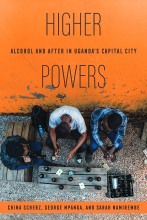By China Scherz, George Mpanga, and Sarah Namirembe
Higher Powers draws on four years of collaborative fieldwork carried out with Ugandans working to reconstruct their lives after attempting to leave behind problematic alcohol use. Given the relatively recent introduction of biomedical ideas of alcoholism and addiction in Uganda, most of these people have used other therapeutic resources, including herbal aversion therapies, engagements with balubaale spirits, and forms of deliverance and spiritual warfare practiced in Pentecostal churches. While these methods are at times severe, they contain within them understandings of the self and practices of sociality that point away from models of addiction as a chronic relapsing brain disease and towards the possibility of release. Higher Powers offers a reconceptualization of addiction and recovery that may prove relevant well beyond Uganda.
Oakland, CA: University of California Press, 2024. 156p.



